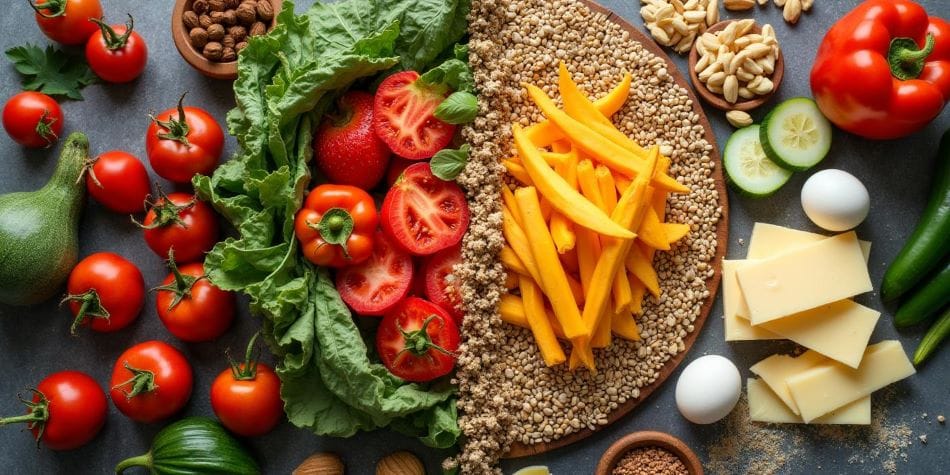Introduction
Understanding Plant-Based Diets
Plant-based diets are gaining popularity as more people recognize their potential health benefits and ethical advantages. Among the most common choices are vegan and vegetarian diets, both of which emphasize plant-based eating while differing in their inclusion of animal products. These diets are often adopted for reasons such as improved health, environmental sustainability, or animal welfare. However, understanding the nuances between these approaches is essential to make informed dietary choices.
Importance of Comparing Vegan vs Vegetarian Health
When exploring the differences between vegan and vegetarian diets, it’s crucial to consider how each impacts overall well-being. Vegan vs Vegetarian Health isn’t just about what you eat; it’s about understanding how different food choices influence your body, nutrient intake, and long-term health outcomes. For instance, while both diets are associated with lower risks of chronic diseases such as heart disease and diabetes, they also come with specific nutritional challenges that require careful planning.
This guide will dive into the health benefits and risks associated with both vegan and vegetarian diets. It will help you understand the shared advantages, unique strengths, and potential drawbacks of each approach. Whether you’re considering a diet change for ethical, environmental, or health-related reasons, learning about Vegan vs Vegetarian Health can empower you to make decisions that align with your goals.
By the end of this post, you’ll have a clear understanding of which diet may be a better fit for your lifestyle and how to maximize the health benefits of your chosen path.
Affiliate Disclaimer
This blog post may include links to affiliate sites. If you click on an affiliate link and make a purchase, we may earn a small commission or receive other compensation at no extra cost to you. Please note that many of the links on our site are affiliate links. Our use of these links does not impact the products, services, or websites we recommend to you. This disclaimer covers all forms of communication with you, including our website, email, phone, social media, products, and other platforms.
Amazon Affiliate Disclaimer
We participate in the Amazon Services LLC Associates Program, an affiliate marketing program that allows us to earn fees by linking to Amazon.com and its affiliated sites. If you click on an Amazon affiliate link on our site and make a purchase, we may receive a small commission at no additional cost to you.
1. What Defines Vegan and Vegetarian Diets?
Understanding the distinction between vegan and vegetarian diets is essential when exploring Vegan vs Vegetarian Health. While both emphasize plant-based eating, they differ in the inclusion of certain foods, making each diet unique in its approach and nutritional implications.
1.1 Vegan Diet Explained
A vegan diet eliminates all animal-derived products, including meat, dairy, eggs, and even honey. This diet is entirely plant-based, focusing on fruits, vegetables, grains, nuts, seeds, and legumes. Vegans often choose this lifestyle for ethical reasons, such as opposing animal cruelty, as well as environmental concerns like reducing carbon footprints.
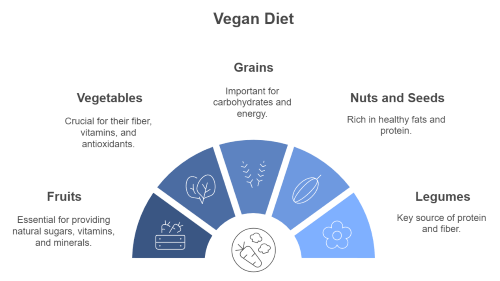
From a health perspective, vegan diets are associated with high fiber and nutrient intake, as they typically include more whole, unprocessed plant foods. However, when discussing Vegan vs Vegetarian Health, it's important to recognize the potential challenges, such as obtaining adequate levels of vitamin B12, iron, and omega-3 fatty acids.
1.2 Vegetarian Diet Explained
A vegetarian diet is less restrictive than a vegan diet, as it excludes meat and fish but allows for other animal-derived products like dairy and eggs. Within the vegetarian category, there are variations:
- Lacto-vegetarians consume dairy but not eggs.
- Ovo-vegetarians include eggs but avoid dairy.
- Lacto-ovo vegetarians consume both dairy and eggs.
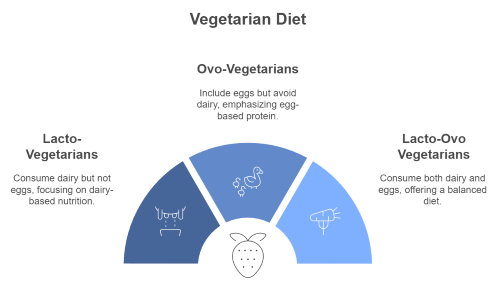
This flexibility often makes vegetarianism more accessible for people transitioning to a plant-based diet. The inclusion of dairy and eggs can make it easier to meet nutritional needs like protein, calcium, and vitamin B12. However, as with vegan diets, it’s still essential to plan meals carefully to ensure optimal health.
1.3 Key Differences in Vegan vs Vegetarian Health
When comparing Vegan vs Vegetarian Health, the key differences lie in the nutritional trade-offs. Vegan diets are typically higher in fiber, antioxidants, and certain vitamins from plant-based sources, making them highly beneficial for heart health and digestion. However, they may pose greater challenges in meeting nutrient needs, particularly for B12, iron, and omega-3s, which are naturally abundant in animal products.
Vegetarian diets, on the other hand, offer more flexibility, allowing for easier access to nutrients like B12 and calcium through dairy and eggs. This makes vegetarianism a more balanced option for some people, particularly those new to plant-based eating or with specific dietary needs. However, vegetarians may consume more saturated fats if they rely heavily on dairy products.
1.4 Making the Choice
Both vegan and vegetarian diets offer substantial health benefits, but they require different levels of commitment and planning. By understanding the foundations of each diet, you can better evaluate Vegan vs Vegetarian Health and determine which approach aligns with your personal goals, lifestyle, and nutritional needs. Choosing the right path depends on your values, health objectives, and willingness to adapt to dietary challenges.
2. Health Benefits of Vegan and Vegetarian Diets
Both vegan and vegetarian diets are widely recognized for their potential health benefits. Understanding the shared and unique advantages of these diets is crucial when evaluating Vegan vs Vegetarian Health. Each offers substantial opportunities to improve well-being, but they also differ in the way they support specific aspects of health.
2.1 Shared Health Benefits
Vegan and vegetarian diets share many health benefits, primarily because both focus on plant-based eating. The emphasis on fruits, vegetables, whole grains, nuts, seeds, and legumes provides essential nutrients that promote overall health. Key shared benefits include:
- Lower Risk of Chronic Diseases: Both diets are associated with reduced risks of heart disease, type 2 diabetes, and certain cancers. This is largely due to the high intake of antioxidants, fiber, and healthy plant compounds.
- Improved Weight Management: Plant-based diets tend to be lower in calories and higher in fiber, which can aid in maintaining a healthy weight.
- Better Gut Health: The fiber content in plant-based foods supports a healthy gut microbiome, improving digestion and reducing inflammation.
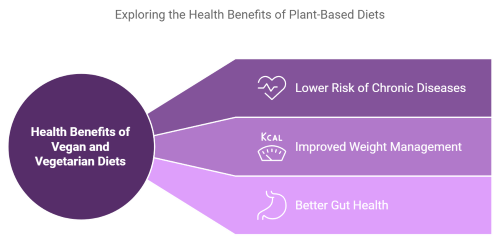
By focusing on nutrient-rich plant foods, both diets provide a strong foundation for long-term health. However, the differences in Vegan vs Vegetarian Health become more apparent when considering the unique benefits of each diet.
2.2 Unique Benefits of a Vegan Diet
A vegan diet eliminates all animal-derived products, which can offer distinct health advantages. These include:
- Higher Antioxidant and Fiber Intake: Vegan diets are often rich in whole, unprocessed foods, which provide more antioxidants and fiber compared to vegetarian diets. These nutrients help combat inflammation and support heart health.
- Better Cholesterol Levels: By avoiding animal products entirely, vegan diets can lead to lower levels of LDL (bad) cholesterol, reducing the risk of heart disease.
- Reduced Environmental Toxins: Some vegans believe that avoiding animal products lowers exposure to certain contaminants, such as hormones and antibiotics found in conventionally raised meat and dairy.
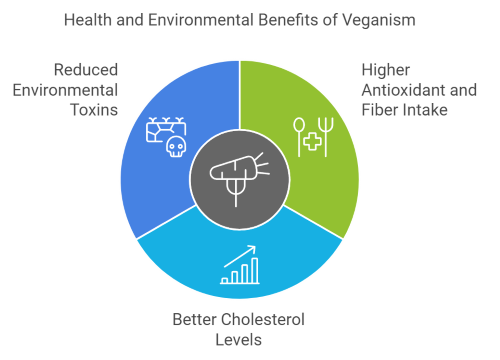
While these benefits make veganism appealing, they require careful planning to avoid nutritional deficiencies, particularly for essential nutrients like B12, omega-3 fatty acids, and calcium.
2.3 Unique Benefits of a Vegetarian Diet
Vegetarian diets, which allow for the inclusion of dairy and eggs, also provide unique health benefits:
- Easier Nutrient Intake: The inclusion of animal-derived products like dairy and eggs makes it easier to obtain nutrients such as B12, protein, and calcium, which are often lacking in vegan diets.
- More Balanced Diet Options: For those new to plant-based eating, vegetarian diets can provide a more flexible and sustainable way to transition to healthier eating habits.
- Higher Bone Health Support: Dairy products in vegetarian diets are a rich source of calcium and vitamin D, essential for maintaining strong bones and preventing osteoporosis.
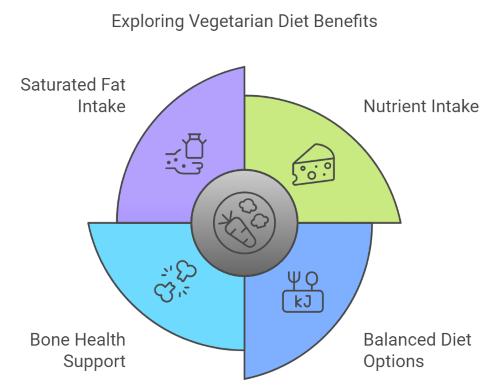
While vegetarian diets are generally more accessible, they can lead to higher saturated fat intake if dairy consumption is not balanced with plant-based foods.
2.4 Evaluating Vegan vs Vegetarian Health
When comparing Vegan vs Vegetarian Health, it’s evident that both diets offer powerful health advantages. Vegans may benefit from a higher intake of antioxidants and a reduced risk of heart disease, while vegetarians have an easier time meeting certain nutrient needs. Choosing the right diet depends on your personal health goals, nutritional needs, and lifestyle preferences. Both diets can be highly effective in improving health when planned thoughtfully and supported by diverse, nutrient-rich foods.
3. Health Risks and Nutritional Challenges
While vegan and vegetarian diets offer numerous health benefits, they also come with potential risks and nutritional challenges. These risks highlight the importance of proper meal planning to ensure balanced nutrition. By examining the specific challenges of each diet, we can better understand how they impact Vegan vs Vegetarian Health.
3.1 Common Risks for Both Diets
Both vegan and vegetarian diets rely heavily on plant-based foods, which, while nutrient-dense, can lack certain essential nutrients. Common risks include:
- Nutrient Deficiencies: Both diets may lead to lower intakes of key nutrients like iron, zinc, and omega-3 fatty acids. Without careful planning, these deficiencies can contribute to fatigue, weakened immunity, and other health issues.
- Insufficient Protein Intake: While plant-based diets can meet protein needs, some individuals may struggle to consume enough, especially if they avoid protein-rich foods like legumes, nuts, and tofu.
- Over-Reliance on Processed Foods: Many plant-based eaters turn to processed meat substitutes or convenience foods, which can be high in sodium and additives, potentially offsetting the health benefits of the diet.
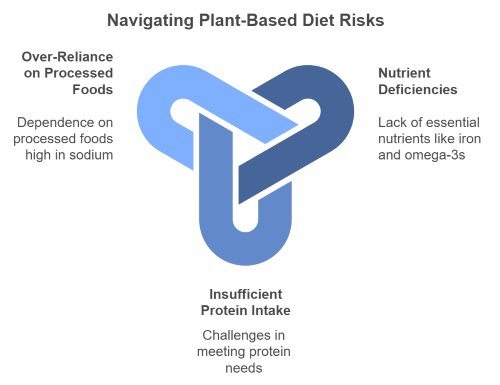
Addressing these common challenges requires a well-rounded diet that includes a variety of nutrient-rich plant-based foods.
3.2 Specific Challenges of Vegan Diets
Vegan diets exclude all animal products, which can make it harder to obtain certain nutrients naturally found in these foods. Key challenges include:
- Vitamin B12 Deficiency: B12 is critical for nerve function and red blood cell production, but it’s only found naturally in animal products. Vegans must rely on fortified foods or supplements to meet their needs.
- Low Calcium and Vitamin D Levels: Without dairy, vegans may struggle to consume enough calcium, essential for bone health, and vitamin D, which aids in calcium absorption.
- Limited Omega-3 Intake: Plant-based sources of omega-3s, like flaxseeds and walnuts, provide ALA, which must be converted to the more bioavailable EPA and DHA. This conversion is often inefficient, increasing the risk of deficiency.
- Social and Practical Barriers: Vegan diets can be challenging in social settings or when dining out, as options may be limited. This can make long-term adherence more difficult.
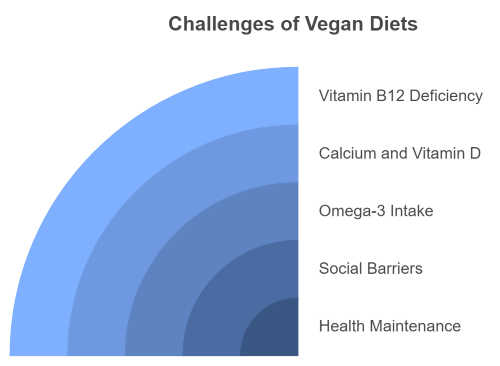
Despite these challenges, veganism can still support excellent health with the right planning and supplementation.
3.3 Specific Challenges of Vegetarian Diets
While vegetarian diets are generally more flexible, they come with their own set of risks:
- Higher Saturated Fat Intake: Dairy and eggs, which are staples in many vegetarian diets, can contribute to higher saturated fat intake if not consumed in moderation. This can impact heart health over time.
- Over-Reliance on Dairy Products: Some vegetarians may consume excessive dairy to meet their protein or calcium needs, leading to an imbalance in their diet.
- Potential Weight Gain: The inclusion of calorie-dense foods like cheese and eggs, combined with a less restrictive approach, can lead to unintended weight gain if not balanced with other nutrient-dense foods.
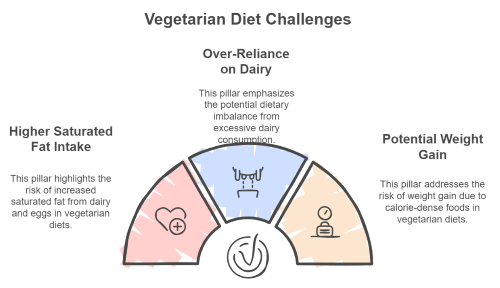
3.4 Evaluating Risks in Vegan vs Vegetarian Health
When considering Vegan vs Vegetarian Health, it’s clear that both diets require thoughtful planning to avoid nutritional challenges. Vegans face more significant risks related to nutrient deficiencies, while vegetarians may encounter issues with saturated fat and calorie balance. The key to overcoming these risks lies in diversifying food choices, incorporating fortified foods or supplements, and monitoring your nutrient intake to support overall health. Both diets can be healthy and sustainable with the right strategies in place.
4. Practical Tips for Adopting a Plant-Based Diet
Transitioning to a plant-based diet, whether vegan or vegetarian, can bring significant health benefits. However, proper planning is essential to ensure balanced nutrition and long-term success. By focusing on practical strategies, you can avoid common pitfalls and fully enjoy the advantages of plant-based living. These tips will help you navigate the challenges and maximize Vegan vs Vegetarian Health.
4.1 Nutritional Planning for Both Diets
Plant-based diets require a focus on nutrient density to ensure your body gets everything it needs. To support your health effectively:
- Prioritize Protein Sources: Both vegans and vegetarians should include a variety of plant-based protein sources, such as beans, lentils, tofu, tempeh, nuts, and seeds. Vegetarians can also incorporate eggs and dairy for additional protein options.
- Focus on Iron and Zinc: Include iron-rich foods like leafy greens, legumes, and fortified cereals. Pair these with vitamin C sources (e.g., citrus fruits) to enhance absorption. Zinc can be found in nuts, seeds, and whole grains.
- Incorporate Healthy Fats: For omega-3 fatty acids, rely on flaxseeds, chia seeds, walnuts, and algae-based supplements. These are particularly important for vegans to address the challenges of Vegan vs Vegetarian Health.
- Supplement Where Necessary: Vegans should consider supplements for vitamin B12, and both vegans and vegetarians may need vitamin D or calcium supplements, depending on their food choices.
4.2 How to Transition Smoothly
Switching to a plant-based diet doesn’t have to be overwhelming. Gradual changes can make the process more manageable and sustainable:
- Start Small: Begin by replacing a few meals per week with plant-based options, then gradually increase until you fully adopt your chosen diet.
- Explore Recipes: Try new plant-based recipes to keep your meals exciting and diverse. Experimenting with international cuisines can introduce you to flavorful dishes rich in nutrients.
- Plan Your Meals: A well-thought-out meal plan can prevent nutrient gaps and ensure you’re meeting your daily needs. Batch cooking and prepping ahead of time can save effort and reduce reliance on processed foods.
- Be Flexible: Transitioning is a learning process, so don’t be discouraged by setbacks. Adapt your approach as needed to make plant-based eating work for your lifestyle.
4.3 Tips for Eating Out and Social Settings
One of the challenges in Vegan vs Vegetarian Health is navigating social settings or dining out. To make these situations easier:
- Research Menus: Look for restaurants that offer vegan or vegetarian-friendly options. Many establishments now highlight these on their menus.
- Communicate Your Needs: Don’t hesitate to ask for modifications to menu items to suit your dietary preferences.
- Bring a Dish: If attending a gathering, contribute a plant-based dish that you enjoy and can share with others.
4.4 Long-Term Strategies for Success
Maintaining a plant-based diet requires ongoing effort to ensure balanced nutrition:
- Regular Health Checkups: Monitor your nutrient levels, especially for B12, iron, and vitamin D, through regular blood tests.
- Stay Educated: Keep learning about plant-based nutrition to stay informed about new products, recipes, and strategies for better health.
- Connect with Communities: Join online or local groups focused on plant-based lifestyles for support, tips, and motivation.
Adopting a plant-based diet offers incredible benefits for Vegan vs Vegetarian Health when approached with care and preparation. By following these tips, you can enjoy a healthier lifestyle while avoiding common challenges, ensuring your transition is both successful and fulfilling.
5. Choosing the Right Diet for You
Deciding between a vegan or vegetarian diet is a personal choice influenced by factors like health goals, lifestyle, and ethical considerations. Both diets offer numerous benefits, but they also differ in terms of flexibility, nutrient availability, and sustainability. By evaluating these aspects, you can make an informed decision that aligns with your priorities and maximizes the potential of Vegan vs Vegetarian Health.
5.1 Assessing Your Health Goals
Understanding your health goals is the first step in choosing the right diet. Both vegan and vegetarian diets can support various health objectives, but some distinctions may influence your choice:
- Weight Management: If your goal is weight loss or maintaining a healthy weight, both diets can be effective. However, vegan diets often result in lower calorie intake due to the elimination of calorie-dense animal products, potentially making it easier to achieve weight goals.
- Chronic Disease Prevention: Both diets are associated with reduced risks of heart disease, diabetes, and certain cancers. Vegan diets, with their higher fiber and antioxidant content, may offer additional benefits for heart health.
- Nutrient Optimization: For those concerned about meeting daily nutrient needs, vegetarian diets provide more flexibility by including nutrient-dense dairy and eggs, which can make achieving balance easier.
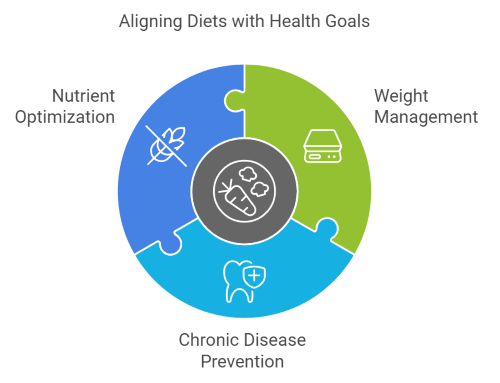
5.2 Evaluating Lifestyle and Practicality
Your daily routine, social environment, and access to food options can significantly impact the feasibility of each diet:
- Convenience: Vegetarian diets are generally easier to maintain due to the wider range of food options available in grocery stores and restaurants. This can be especially important for individuals who frequently dine out or have busy schedules.
- Social Settings: Vegan diets can present challenges in social situations, as options may be more limited. Vegetarian diets, with their inclusion of dairy and eggs, often offer more flexibility in these scenarios.
- Sustainability: Consider whether you can commit to the stricter requirements of a vegan diet over the long term. For some, starting with a vegetarian diet and transitioning to veganism later may feel more sustainable.
5.3 Aligning with Ethical and Environmental Values
Ethical and environmental concerns are often key motivators for adopting plant-based diets:
- Animal Welfare: Vegan diets completely avoid animal-derived products, aligning more closely with ethical concerns about animal cruelty.
- Environmental Impact: Both diets reduce the environmental footprint compared to omnivorous diets, but vegan diets typically have a greater impact due to the elimination of all animal agriculture.
5.4 Tips for Making the Decision
When evaluating Vegan vs Vegetarian Health, consider the following tips to help you decide:
- Start with a Trial Period: Experiment with each diet for a few weeks to see which one suits you best in terms of taste preferences, energy levels, and practicality.
- Consult a Nutritionist: Seek professional advice to ensure that your chosen diet meets your specific health needs and minimizes the risk of deficiencies.
- Stay Flexible: Your needs and preferences may evolve over time. It’s okay to adjust your diet to better fit your lifestyle and goals.
By carefully assessing your health objectives, lifestyle, and values, you can determine whether a vegan or vegetarian diet is the right choice for you. Both options offer tremendous benefits, but the key to success lies in finding the balance that supports your well-being and aligns with your priorities. Understanding the nuances of Vegan vs Vegetarian Health will empower you to make a decision that enhances your health and enriches your life.
Conclusion
Recap of Vegan vs Vegetarian Health
Vegan and vegetarian diets are powerful tools for improving overall health, reducing environmental impact, and aligning with ethical values. Both diets emphasize plant-based eating, offering shared benefits such as reduced risks of chronic diseases, better weight management, and improved gut health. However, the differences in their nutritional profiles and flexibility highlight the unique aspects of Vegan vs Vegetarian Health. Vegans benefit from higher fiber and antioxidant intake, while vegetarians find it easier to obtain essential nutrients like calcium, vitamin B12, and protein through dairy and eggs.
The Importance of Thoughtful Choices
Choosing between vegan and vegetarian diets requires careful consideration of your health goals, lifestyle, and personal values. A vegan diet may be ideal for those who prioritize minimizing their environmental footprint and completely avoiding animal products. On the other hand, a vegetarian diet may suit individuals seeking a more balanced approach with easier access to diverse food options.
Both diets require thoughtful planning to avoid common nutritional pitfalls. Incorporating diverse whole foods, exploring fortified products, and considering supplementation are essential steps to optimize Vegan vs Vegetarian Health. Regular health monitoring and adjustments based on personal needs can further enhance the benefits of your chosen diet.
Moving Forward
Ultimately, there is no one-size-fits-all approach to plant-based eating. Whether you choose veganism, vegetarianism, or a combination of both, embracing a plant-focused lifestyle can positively impact your health and the world around you. By understanding the differences and similarities between vegan and vegetarian diets, you can make a choice that aligns with your values, supports your well-being, and sets you up for long-term success.
FAQs
1. What is the main difference between vegan and vegetarian diets?
Vegans avoid all animal products, while vegetarians include dairy and eggs but exclude meat and fish.
2. Which diet is healthier, vegan or vegetarian?
Both can be healthy when well-planned. Vegans may benefit from more antioxidants, while vegetarians find it easier to meet certain nutrient needs.
3. Can vegan and vegetarian diets prevent chronic diseases?
Yes, both diets are linked to lower risks of heart disease, diabetes, and certain cancers due to their plant-based focus.
4. Do vegan diets lead to nutrient deficiencies?
Vegan diets may lack B12, calcium, and omega-3s without proper planning or supplements, but these gaps can be addressed.
5. Is it easier to maintain a vegetarian diet than a vegan diet?
Yes, vegetarian diets offer more flexibility and food options, making them easier to follow in social settings and daily life.
6. Can I lose weight on a vegan or vegetarian diet?
Yes, both diets can support weight management due to their high fiber and lower calorie content when focused on whole foods.
7. Which diet is better for the environment?
Vegan diets typically have a lower environmental impact, as they eliminate all animal agriculture, which is resource-intensive.


